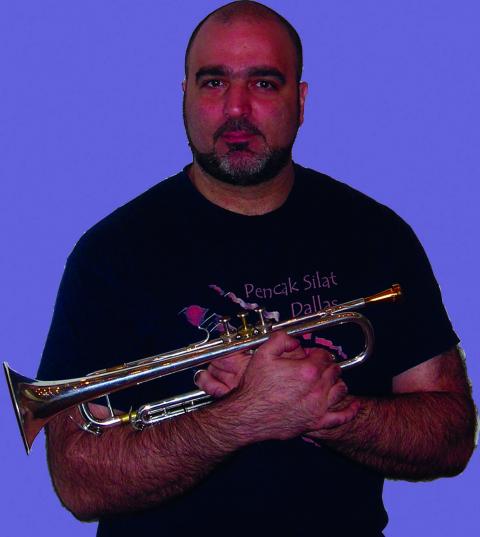Alumni Profile: Barry Danielian '82

Session trumpeter Barry Danielian ’82
Mark Small
Trumpeter Barry Danielian has just returned from a recording session. His description of the afternoon points up the challenges that seasoned studio musicians face daily in the continually evolving music industry and the ways they meet challenges.
“I just did a jingle for a pain relief medication,” says Danielian. “They were going for a sixties soul vibe with the music. The sax player and I know that style inside out and we were giving it to them, but the engineer kept saying it didn’t sound right. We even layered the sax over the music like they used to do back then. It sounded good, but I knew what was wrong. In the sixties, you’d have a four-piece horn section to get a full sound. Also, a lot of current engineers have grown up on hip-hop; all they know are computer sounds. Many times I work with people who are recording live horns for the first time.” That’s where Danielian’s finesse and wealth of experience comes in. “Sometimes, you have to convince rappers or engineers that what you’re doing is cool,” he says.
Since he left Berklee in 1982, Danielian has been busy as a trumpeter, arranger, producer, and composer. He has played on more than 300 recordings working with such pop artists as James Taylor, Ricky Martin, Billy Joel, Lenny Kravitz, Queen Latifah, Bruce Springsteen, and more as well as with jazz artists Paquito D’Rivera, Illinois Jacquet, David Samuels, and Branford Marsalis to name a few (visit www.barrydanielian.com for more information). He’s also toured extensively with Barbra Streisand, Tower of Power, and Blood, Sweat and Tears and has played numerous Broadway shows (from Paul Simon’s ill-fated Capeman to Spamalot), and recorded two CDs of original material. His latest effort, Paradigm Shift, will be released this fall.
Given his diverse tastes and ability to play many styles, Danielian’s own recordings end up being pretty eclectic. His musical interests run from hard funk to salsa to bebop and beyond. “Paradigm Shift has everything from Herbie Hancock–style funk, to influences from Senegal and Morocco,” he says. “I even have an oud player on it. I’m stretching out more as a player on this one too.”
His first solo CD, Common Ground, taught him lessons about the climate of the record industry. “I took it around to lots of labels, and clearly everybody liked it,” he says. “But because it was funky and had world-beat vibes as well as traces of hip-hop and jazz, they all pretty much said, ‘We don’t know how to market this.’ That was sad. My friends told me to just put it out myself, which I did. I consider it a success because it sold enough for me to finance Paradigm.”
Danielian’s greatest accomplishment may be surviving the transitions in the music business over the years. He credits his longevity in the biz to his education at Berklee and advice he got from a classmate in the early eighties. “One of the best things that ever happened to me, musically speaking, was meeting Branford Marsalis at Berklee,” Danielian says. “He was really helpful, telling me about players I hadn’t listened to yet, like Clifford Brown and Fats Navarro. There’s a line of essential trumpet players that starts with Louis Armstrong and runs up through Wynton Marsalis. Maybe the most important thing I’ve learned as a musician is that if you don’t learn ‘the tradition,’ it will be apparent in your playing. Hearing me play, Branford could tell that I hadn’t investigated the old-school players. He always stressed, ‘You gotta do your homework!’”
Danielian says that this maxim was driven home when he successfully auditioned for salsa giant Eddie Palmieri. “I was immersed in salsa when I auditioned for Eddie. A lot of other guys would play for him and they were good, but you could just hear that the dudes didn’t know anything about Cuban music. So they didn’t get the gig.”
While he is an acoustic instrumentalist with deep respect for the various traditions in trumpet playing, Danielian isn’t fighting to turn back the clock. He continues to get hired because he finds ways to make what he does fit into new musical traditions. Aware that technology isn’t going away and has forever changed the way music is recorded, Danielian has embraced it to remain viable as a studio musician. “We have to deal with that,” he says. “There’s no going back to the old days when a bunch of people played together live in the studio.” To speed the learning curve, he built a home studio about 10 years ago where he now does a fair amount of session work. It’s also where he recorded his first solo album.
While the current scene for freelance musicians in New York is probably tougher than ever, Danielian urges young players not to lose heart. “The new music—hip-hop especially—is usually made by guys who only know about machines,” he says. “Instead of getting frustrated, learn as much as you can about how the new guys are making records. I’ve played for Jay-Z, and I know you can talk him into doing interesting stuff with horns. Once you get to speak their language and show them that some of the things you want to do will make their records sound even cooler, you’ll get the gig. While you can’t go back to yesterday, you can definitely be a working musician today. It involves just taking the time to learn the old rules—and the new ones too.”
Peter Gerstenzang ’77 is a freelance musician, writer and humorist. His articles have appeared in The New York Times and Rolling Stone.




